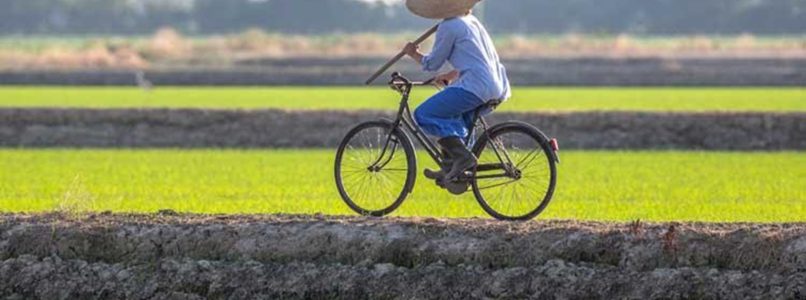From a degree in History to the love of agriculture, Igiea Adami tells and tells her own rice
We had a chat with Igiea Adami, mind of Goods of Busonengo, his Risicola company.
Rice in Busonengo is an old story, a story that begins in the mid-1500s.
An ancient and profound love, that of Igiea, after graduation decided that she had to follow her instincts and return to the earth. The company and the ancient village are located between two important rivers in the Vercelli area, the Cervo and the Elvo.
Busonengo Rice of Beni is 100% Carnaroli.
Can you tell us who is Igiea Adami?
My name is Igiea, an ancient and somewhat original name. Igiea was a nymph in ancient Greece, dedicated to health and medicine, and was the name of my Sicilian great-grandmother.
I was born and raised in Turin, I studied history at university and history is a passion that follows me in all that what I see and what I do. I always think of the stories of men I know, of the things I see and the places I visit; mine is a kind of professional deformation.
Why did you decide to grow rice? Is it a family tradition?
Despite having undertaken humanistic studies, I always thought that when I grew up I would be a farmer and take care of a large rice paddy, a somewhat mysterious and little-known place that my family owned in the Vercelli area.
It has been rented for years, then for a certain period no one has taken care of it, except my aunt, she was in charge of the paperwork and relations with the tenants.
Finally in 2009, Busonengo – a small hamlet of Villarboit, in the province of Vercelli – became “ours” again and out of nothing (that is, from very few knowledge of the subject) we began to take care of her.
It was love immediately. Busonengo exudes history from every brick. Here you could write the history of Italy walking in the small village, there are traces of peasant history (starting from the XII century, the era to which the first buildings date back), of water passages, people, shepherds, transhumances, of faith and there are three small churches.
In the eighteenth century Busonengo was a fief of the Falletti of Barolo; in the nineteenth century Giulia and Tancredi di Barolo made it their social and agricultural experiment.
Then there are traces of an inglorious fascist passage, traces of peasant protests (on the walls you can read writings such as Viva Togliatti and Abbasso De Gasperi) and the dormitories of mondine are a real treasure trove of history and intangible culture.
In short, Busonengo is the my place.
And this is only a small part, the most pleasant part, of what our real job is: growing rice.
It all starts with the chance meeting with Matteo, a young farmer from Olcenengo, a small neighboring town, who immediately helped us in this venture. I was attending a course of History and Institutions of the Arab World at the University with his wife and meeting with him and Matteo, who is now the cornerstone of Busonengo, was the classic example of serendipity.
Together with Matteo, we designed our way of growing rice, his experience and our vision of environmentally friendly agriculture.
We studied and created Terreamano, the hand-transplanted rice with zero weeds.
An ambitious rice cultivation project with the old transplanting technique, now abandoned and replaced by machinery and pesticides.
In short, our dream for Busonengo is to revive it, find new stimuli and people who can live in it, maybe open a small restaurant (once there were two inns). The ideas are many and we hope sooner or later to realize them all.
After this pandemic (which we hope will be at the end of its days) we have awakened from a numbness, from a somewhat cataloged life, made of serial and unhealthy habits. For many there has been a return to nature, to different priorities. For you, who live and work in direct contact with nature, what do you think will happen in the coming years? Will we be able to get out of this state of global frenzy to return to a simpler way of life or is it an irreversible process?
During the pandemic I believed that everything would change in everyone's habits, I believed that this imprisonment had taught us to slow down, not to stuff our lives with a thousand activities, perhaps useless, certainly redundant, but I fear that the period was "short"? Now it seems that we are all slowly returning to the frenzy of before.
For our family, the boys are 12 and 13 years old, it was the first time we really lived the countryside in such a total way: it's paradoxical! For the first time we made the vegetable garden starting from the seeds, for the first time we really and deeply witnessed the birth of spring, for the first time the boys spent the whole day cycling and outdoors. In contact with animals, to observe the hatching of the eggs in the nests.
Many signs of imprisonment, however, will remain fixed in our society: one of these is a desire for nature: and then the baking.
In short, a small thorn is wedged and pushes; there has been more attention to the products, people have probably learned to select them, to do research, if they have them sent home. Online commerce has increased exponentially.
We have created a site for the sale of rice and met with some success. It can be done.
